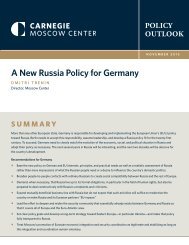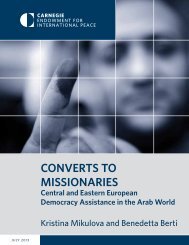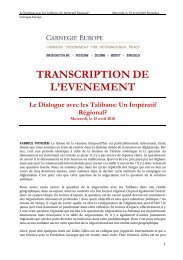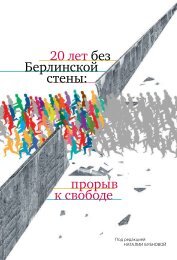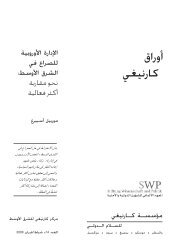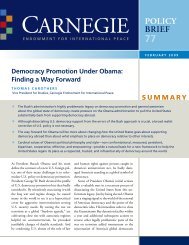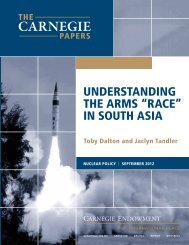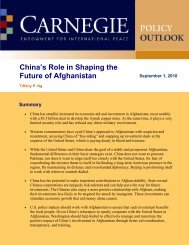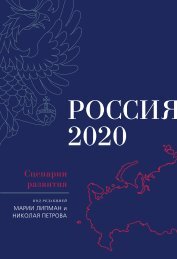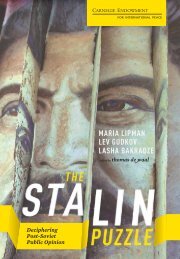getting to pluralism: political actors in the arab world - Carnegie ...
getting to pluralism: political actors in the arab world - Carnegie ...
getting to pluralism: political actors in the arab world - Carnegie ...
Create successful ePaper yourself
Turn your PDF publications into a flip-book with our unique Google optimized e-Paper software.
Transcript Not Checked Aga<strong>in</strong>st Delivery<br />
MS. OWEIDAT: No, try<strong>in</strong>g <strong>to</strong> <strong>in</strong>fluence – clearly regimes don’t listen <strong>to</strong> <strong>the</strong>ir people, don’t<br />
care about <strong>the</strong>ir people. They clearly care about <strong>the</strong> U.S. actions, so why are <strong>the</strong>y not exploit<strong>in</strong>g<br />
this?<br />
Q: Michael Lang (sp), Reth<strong>in</strong>k <strong>the</strong> Middle East. Perhaps, because this is <strong>the</strong> United States,<br />
we assume that democracy is a good, is a virtue, and so I’ve missed largely from this panel about<br />
what difference would it make if Arab countries were democratic. We know that democracies can<br />
launch wars. We know that democracies can be corrupt. We know that democracies, <strong>in</strong>clud<strong>in</strong>g our<br />
own, can mismanage economies.<br />
So is it just, <strong>in</strong> and of itself, you want Arab countries <strong>to</strong> be democratic because you th<strong>in</strong>k<br />
that’s good, or do you have some – are you envision<strong>in</strong>g – what k<strong>in</strong>d of difference could it make for<br />
<strong>the</strong> society, for <strong>the</strong> region, if <strong>the</strong>y were democratic?<br />
Q: I just have a couple comments directed at Tom. I’m Joel Sawyers, George<strong>to</strong>wn<br />
University. We entered <strong>in</strong><strong>to</strong> <strong>the</strong> realm of overgeneralization. For example, you mentioned Lebanon<br />
as a case where <strong>the</strong> moderates succeeded but <strong>the</strong>y still need <strong>to</strong> actually govern. And by succeeded,<br />
you obviously referred <strong>to</strong> <strong>the</strong> elections.<br />
There’s only one smaller problem: that <strong>the</strong> Christian-Hezbollah March 9 th coalition actually<br />
won by 54 percent of <strong>the</strong> vote. The confessional system didn’t allocate those seats <strong>to</strong> <strong>the</strong>m as it<br />
normally would <strong>in</strong> a normal democratic regime. So I th<strong>in</strong>k <strong>the</strong> facts here are important.<br />
The o<strong>the</strong>r th<strong>in</strong>g – I k<strong>in</strong>d of cr<strong>in</strong>ge when I hear of Salam Fayyad. If you go back <strong>to</strong> <strong>the</strong><br />
archives, and hear talk about Mubarak, and how he’s a modernizer, he’s go<strong>in</strong>g <strong>to</strong> – this benevolent,<br />
liberal enlightened dicta<strong>to</strong>r is go<strong>in</strong>g <strong>to</strong> br<strong>in</strong>g all this change <strong>to</strong> Egypt, it’s very similar <strong>to</strong> Fayyad. He<br />
has no democratic mandate, he was appo<strong>in</strong>ted by someone whose presidency is up, and he has zero<br />
support <strong>in</strong> <strong>the</strong> West Bank among <strong>the</strong> people except <strong>the</strong> only, <strong>the</strong> support –<br />
MR. FRIEDMAN: That, that’s, that’s patently not true. I mean, you can just look <strong>the</strong> latest<br />
polls by Shikaki. I mean <strong>to</strong> say he has zero support <strong>the</strong>re? Patently not true. Not even close. Talk<br />
about overgeneralization. That one’s out of <strong>the</strong> ballpark.<br />
MR. SAWYERS: Alright, a plurality – he doesn’t even have that. He’s popular <strong>in</strong><br />
Wash<strong>in</strong>g<strong>to</strong>n and maybe Ramallah.<br />
MR. FRIEDMAN: I’m afraid you’re not up-<strong>to</strong>-date on that. (Laughs.)<br />
MS. OTTAWAY: I th<strong>in</strong>k it’s wrong <strong>to</strong> state that it was U.S. <strong>in</strong>tervention <strong>in</strong> Iraq that really<br />
provided <strong>the</strong> only support for a drive <strong>to</strong>wards democracy. The debates concern<strong>in</strong>g democracy, <strong>the</strong><br />
debates concern<strong>in</strong>g <strong>political</strong> change started well before 2003. It’s not that it came out of nowhere.<br />
What <strong>the</strong> U.S. pressure did, it did conv<strong>in</strong>ce a lot of government <strong>to</strong> take some steps. But<br />
<strong>the</strong>y <strong>to</strong>ok cosmetic steps, because <strong>the</strong> problem is – I th<strong>in</strong>k <strong>to</strong> me <strong>the</strong> lesson is very different than <strong>the</strong><br />
lesson from <strong>the</strong> U.S. attempt <strong>to</strong> promote democracy <strong>in</strong> this countries; that unless <strong>the</strong>re are groups <strong>in</strong><br />
<strong>the</strong> country, unless <strong>the</strong>re are <strong>political</strong> forces <strong>in</strong> <strong>the</strong> countries – and here we go back <strong>to</strong> <strong>the</strong> weakness<br />
of <strong>political</strong> ac<strong>to</strong>rs – that can pick up <strong>the</strong> ball and run with it, it’s not go<strong>in</strong>g <strong>to</strong> make any difference<br />
because governments, yes <strong>the</strong>y feel under pressure, and <strong>the</strong>n <strong>the</strong>y make a little concessions and <strong>the</strong>n,




